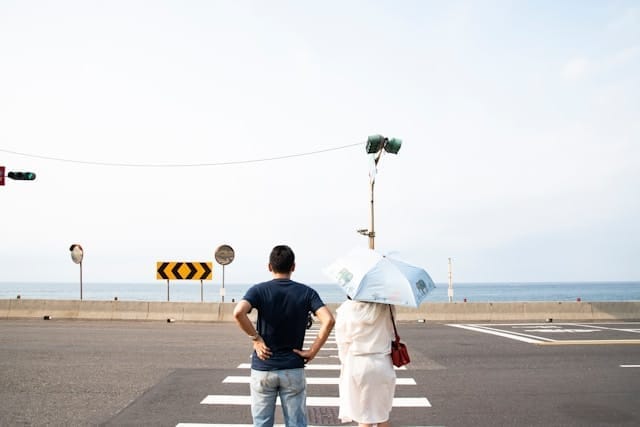When the Dust Settles: What Happens to Love After the Logistics Are Done
Foto: Buddy Photo | Unsplash
When the rush of relocation fades, many couples find themselves in a strange in-between: stable, but not yet fully at home.
It’s not a collapse, not a crisis — but a space where connection needs care and attention, or it risks quietly thinning out.
When you first arrive in a new country, there’s so much to do that your relationship often runs on autopilot.
You’re making decisions, solving problems, tackling the checklist of a new life. Survival mode carries you through the first months. For a while, that momentum carries you. It feels productive, even energizing.
Maybe even stronger because you’re facing it all together.
But once the logistics settle and a new everyday rythm is set, something quieter can surface.
It’s not that anything is obviously wrong.
It’s just that the life you’ve built isn’t fully yours yet.
This in-between phase often catches couples off guard: when the urgency fades, what’s left isn't a crisis, but a kind of emotional disorientation.
The adrenaline of change fades, and what remains is a kind of adjustment fatigue or tiredness — emotionally, relationally, even individually.
A sense that the partnership needs space to breathe, recalibrate, and find its footing again.
This phase is the natural — and often overlooked — aftermath of big transitions.
It's where couples need to pause, readjust, and consciously build authenticity into a life that was, until now, mostly about adaptation.
Let’s explore what happens in this phase, and why nurturing your relationship intentionally matters more than ever.
The Hidden Phase: Adjustment Fatigue as a Couple Abroad
Adjustment fatigue usually isn’t dramatic. It’s quiet and slow.
You’re no longer "new," but you're not truly settled either.
The novelty wears off, and real life starts — but you and your partner may realize you're both a little worn down by the effort it took to get here.
TYPICAL SIGNS OF ADJUSTMENT FATIGUE:
Feeling emotionally flat or easily irritable
Less curiosity toward each other’s experiences
Going through the motions without feeling fully present
A subtle sense of loneliness, even together
✨ The blog post "What Moving Abroad Does to Your Relationship (That No One Prepares You For)" might be an interesting read for you.

Foto: Simona Toma | Unsplash
The New Normal: Comfortable, But Not Always Authentic
Once survival mode ends, couples often dive headfirst into "building a new life" or a "new normal" abroad — routines, new hobbies, new social circles, organising activities for school. This is is a very human response to upheaval.
But sometimes, these new lives are shaped more by necessity than by real choice.
It’s easy to slip into a rhythm that looks fine on the outside but doesn’t feel quite right on the inside. And maybe you're chasing a version of life that "should" make you happy — and eventually feels a little hollow.
The risk: The couple starts living parallel lives without even noticing.
Maybe you find yourselves busier with activities and new friendships but less connected as a couple.
It’s easy to assume "we’ll find time for us later" — but often, "later" gets postponed indefinitely.
The truth is: after a big life change, it takes time to realign not just your external life but also your internal compass — individually, and together.
Why This Phase Matters for Your Relationship
So you made time to find schools and a babysitter, a new dentist, a house, a gym.
It’s tempting to think that now that life feels calmer, connection will naturally rebuild itself.
But let me tell you that this is a fallacy: Without regular investment, emotional connection and intimacy doesn’t automatically "reappear" just because life is less chaotic.
Your relationship deserves the same intentional planning.
In fact, this middle phase is where small distances can quietly grow if they aren't noticed.
TYPICAL SHIFTS COUPLES EXPERIENCE NOW:
Emotional check-ins become rare ("We're fine, right?")
Couple rituals disappear under the busyness of settling in
Differences in how each partner processes the move become more obvious
Misalignments about what "success" or "happiness" looks like abroad
💡 Many expat couples don't neglect each other out of lack of love — it's simply that the external demands are so high, and "us" becomes an afterthought.
So we need to remind ourselves to set the right priorities once the dust has settled.

Foto: Tsai Sen Yu | Unsplash
Practical Ways to Nurture Your Connection Now
The good news?
This is a phase of opportunity — not because struggle magically "builds character," but because small, intentional actions here can anchor you together again.
Here are 5 Ideas for rebuilding and deepening connection:
1. Reestablish Couple Rituals
Research (including the work of the Gottman Institute) shows that shared rituals of connection are crucial for relationship health.
Simple practices like:
Morning coffee together before checking phones
A Sunday walk without the kids
A monthly "state of us" dinner
2. Prioritise "Just Us" Time
Building a new community is important —
but if every evening and weekend is booked with social engagements, “family friends trips”, extended brunches, you may find yourselves side-by-side without really seeing each other.
A full social calendar won’t compensate for relational distance.
It's about balancing outside connections with inside connection.
💡 Protect regular time that's just for you two.
Rule of Thumb: simple but consistent.
3. Talk About Ambiguity
Name the weirdness out loud.
"It feels strange that everything is set up, but I don’t feel totally settled."
Giving language to the experience makes it less isolating.
4. Recognise Individual Processing Timelines
One partner might be thriving while the other is still struggling internally. This doesn’t mean you're out of sync forever — it just means you each have your own pace.
5. Allow Space for Redesign
Maybe the roles you took on during the move (organizer, breadwinner, caretaker) aren't the ones you want to stay in forever.
It’s okay to renegotiate.
Ask: "Is this version of life working for both of us?"

Foto: Collin Merkel | Unsplash
Finding Your Footing Together
Relocation isn’t a story with a neat ending after the boxes are unpacked.
Settling abroad starts with the outside world feeling stable — and continues with feeling connected inside your relationship again.
You’re allowed to slow down, to protect the space between you, and to rebuild it with as much intention as you built your new life abroad.
If you’re in that strange space of feeling stable but a little stretched, know that it’s normal.
Just remember that your relationship still needs intentional care and nurturing now, in these quieter, everyday moments, after the dust has settled.
It’s in these moments that you’ll find your way back to each other, with renewed purpose and connection.
👉 You might want to continue here:
Common Struggles That Expat Couples Face
How Different Phases of Expat Life Put Different Pressure on Your Partnership
Let me know what you think in the comments!
Newsletter
Want thoughtful updates now and then?
Subscribe to the newsletter—easy to join, easy to leave anytime.



